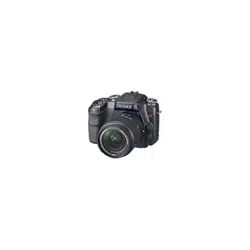Loading ...
Loading ...
Loading ...

14
15
Icons:
Circular aperture Internal focusing Focus Hold Button Focus Range limiter ADI flash metering SSM (Super sonic wave motor)
• For details, please refer to the Lens Technology section on p.26–28.
SAL135F28
135mm F2.8 [T4.5] STF
Lens groups/elements: 6/8
( includes 1 group with 2 APD elements)
Minimum focus: 34-1/4” (0.87 m)
Filter diameter: 72 mm
Size: (diameter x length): 3-1/8 x 3-7/8”
(80 x 99 mm)
Weight: 1 lb 9.7 oz (730 g)
The special-purpose lens allows you to create truly unique
images with exceptionally smooth transitions between in-focus
and defocused areas. This is achieved through apodization
optics, which gives your images added dimensionality and
also contributes to the natural spread of highlights. Clarity at
the point of focus is superb, and vignetting and double-line
defocusing are avoided. A separate manual aperture ring
gives you added control over defocusing of objects at the
edges of the image.
•
•
•
•
•
SAL135F28 (135mm F2.8 [T4.5] STF)
STF (Smooth Trans Focus) Lens
Manual focus only
Teleconverter compatible
Ideal Defocusing with the
STF Lens
In a conventional lens, the amount of light
collected at the periphery of the lens is roughly
equal to the amount of light at the center. This
results in uniformly sharp objects at points
b and c, below. The STF lens, however, uses
a special filter called an “apodization
optical element” that collects less light at
the lens periphery, which results in diffusion
at the edges of the objects instead.
Smoother defocusing is due to this optical
characteristic.
STF lens
Apodization optical element
Defocusing of STF lens
(around focus point “a”)
A
a
b c
A
Conventional lens
Defocusing of conventional
lens (around focus point “a”)
a
b c
STF Lens & T Numbers
Because the STF lens collects less light overall
than conventional lenses, F-stops are replaced
by T (transmission) numbers. In practice,
the two types of values can be used
interchangeably to determine exposure.
SAL500F80
500mm F8 Reflex
Lens groups/elements: 5/7
(includes 1 filter)
Minimum focus: 151-1/2” (4.0 m)
Filter diameter: 42 mm
(rear slide-in type)
Size: (diameter x length): 3-1/2
x 4-5/8” (89 x 118 mm)
Weight: 1 lb 7.5 oz (665 g)
A unique reflex lens that provides autofocusing through
the innovative combination of a mirror lens system and the
camera’s AF sensor. Captures impressively clear images
with none of the chromatic aberration that often mars
conventional refractive lenses, and produces distinctive
ring-shaped defocusing effects. Light and compact for a
super-telephoto lens, and thus an ideal option for nature
and wildlife photography, especially as a means of
minimizing gear. Includes focus hold button.
•
•
•
•
•
SAL500F80 (500mm F8 Reflex)
Reflex Super-Telephoto Lens
Autofocusing in a Reflex
Telephoto Lens
In AF operation, distance is usually measured
with a beam of light that transmits through the
lens at around F6.7 to F8. If the aperture is any
smaller, then AF cannot function. However, the
SAL500F80 overcomes this limitation by using
a modified optical design in combination with
the camera’s highly sensitive AF sensor. First,
the secondary mirror was reduced in size so
as not to obstruct the metering light. Next, the
primary mirror was enlarged to improve light
collection efficiency. Finally, aberrations were
corrected at the rear of the lens to ensure high
sharpness while also enabling AF.
Secondary mirror Primary mirror Sensor position (equivalent)
Image sensor for AF
Separator lens
Condenser lens
Light beam required for AFExit pupil of 500mm lens
Detail of AF sensor
Loading ...
Loading ...
Loading ...
